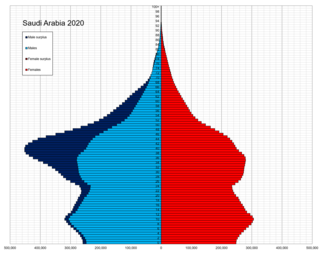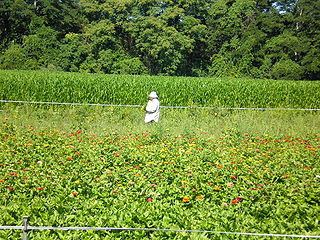
Saudi Arabia is the fourth largest state in the Arab world, with a reported population of 32,175,224 as of 2022. 38% of inhabitants are immigrants. Saudi Arabia has experienced a population explosion in the last 40 years, and continues to grow at a rate of 1.62% per year.

The United Arab Emirates, or simply the Emirates, is a country in West Asia, in the Middle East. It is located at the eastern end of the Arabian Peninsula and shares borders with Oman and Saudi Arabia, while also having maritime borders in the Persian Gulf with Qatar and Iran. Abu Dhabi is the nation's capital, while Dubai, the most populated city, is an international hub.

Foreign workers or guest workers are people who work in a country other than one of which they are a citizen. Some foreign workers use a guest worker program in a country with more preferred job prospects than in their home country. Guest workers are often either sent or invited to work outside their home country or have acquired a job before leaving their home country, whereas migrant workers often leave their home country without a specific job in prospect.

Hinduism has be found in the Middle East since the mid-19th century. Millions of members of the Indian diaspora, of different religions, reside and work in Arab states of the Persian Gulf; many of them are Hindu. Many came due to the migration of Indians and Nepalese expatriates and employees to the area around the Persian Gulf.
Since 1945, immigration to the United Kingdom, controlled by British immigration law and to an extent by British nationality law, has been significant, in particular from the Republic of Ireland and from the former British Empire, especially India, Bangladesh, Pakistan, the Caribbean, South Africa, Nigeria, Ghana, Kenya, and Hong Kong. Since the accession of the UK to the European Communities in the 1970s and the creation of the EU in the early 1990s, immigrants relocated from member states of the European Union, exercising one of the European Union's Four Freedoms. In 2021, since Brexit came into effect, previous EU citizenship's right to newly move to and reside in the UK on a permanent basis does not apply anymore. A smaller number have come as asylum seekers seeking protection as refugees under the United Nations 1951 Refugee Convention.

A migrant worker is a person who migrates within a home country or outside it to pursue work. Migrant workers usually do not have the intention to stay permanently in the country or region in which they work.
Koreans in the Arab world used to form a major part of the worldwide Korean diaspora. Koreans started coming to the Arab world in large numbers in early 1970s as migrant labourers; between 1975 and 1985, 1.1 million Koreans came for work, which made it the third-most popular destination for Korean emigrants. Eventually, most returned home or moved on to other countries, and as of 2014, the South Korean government's own figures showed over 24 thousand of their nationals living in the region. However, South Korean nationals are present in all of the region's countries, and North Korean workers also have a growing presence in several of them.

Overseas Pakistanis, or the Pakistani diaspora, refers to Pakistanis who live outside of Pakistan. These include citizens that have migrated to another country as well as people born abroad of Pakistani descent. According to the Ministry of Overseas Pakistanis and Human Resource Development, approximately 8.8 million Pakistanis live abroad according to December 2017 estimates. According to Ministry of Emigration and Overseas Employment, data released in 2023, states that more than 10.80 Million people moved abroad in last 3 decades years since 1990. beoe.gov.pk
Indians in the United Arab Emirates constitute the largest part of the population of the country. Over 3,860,000 Indian expats are estimated to be living in the UAE, which is over 38 percent of the total population of the UAE and the fourth highest number of overseas Indian people in the world, after the United States, the Kingdom of Saudi Arabia and Nepal. Indian contact with the emirates that now constitute the UAE dates back several centuries, as a result of trade and commerce between the emirates and India. The UAE has experienced a tremendous increase in the population of resident Indians who initially migrated to the country as a result of opportunities in petroleum. Now, Indians are key to the UAE's construction, retail, financial services, healthcare, manufacturing and transport sectors. A sizeable minority of Indian migrants are involved in professional services and entrepreneurship. Relations between India and the UAE have traditionally been very friendly.

Bangladeshis in the Middle East, form the largest part of the worldwide Bangladeshi diaspora. Although Bangladesh only came into existence in 1971, the land of East Bengal which is today Bangladesh has strong ties to the Middle East. Out of the 13 Million Bangladeshis abroad approximately 8 million live within the Middle East, with 2.5 million in Saudi Arabia and a 1 million of them in the United Arab Emirates. Bangladeshis who come to the Middle East are primarily guest workers or day labourers. Bangladesh is one of the largest labour suppliers to Saudi Arabia. In 2007, Bangladeshi workers obtained the biggest share, with 23.50 per cent of the 1.5 million Saudi Arabia visas issued.

Bahrain, officially the Kingdom of Bahrain, is an island country in West Asia. It is situated on the Persian Gulf, and comprises a small archipelago made up of 50 natural islands and an additional 33 artificial islands, centered on Bahrain Island which makes up around 83 per cent of the country's landmass. Bahrain is situated between Qatar and the northeastern coast of Saudi Arabia, to which it is connected by the King Fahd Causeway. The current population of Bahrain is 1,870,817 as of May 14, 2023, based on elaborations of the latest United Nations data, of whom 712,362 are Bahraini nationals. Bahrain spans some 760 square kilometres (290 sq mi), and is the third-smallest nation in Asia after the Maldives and Singapore. The capital and largest city is Manama.

The Bangladeshi diaspora are people of Bangladeshi birth, descent or origin who live outside of Bangladesh. First-generation migrants may have moved abroad from Bangladesh for various reasons including better living conditions, to escape poverty, to support their financial condition, or to send money back to families there. The Ministry of Expatriates' Welfare and Overseas Employment estimates there are 13 million Bangladeshis living abroad, the fourth highest among the top 20 countries of origin for international migrants. Annual remittances transferred to Bangladesh were almost $22.1 billion in 2021, the seventh highest in the world and the third highest in South Asia.
The Kerala Gulf diaspora refers to the people of Kerala living in the West Asian Arab states of the Persian Gulf. In 2008, they numbered more than 3.5 million. Nearly 80 percent of Indians living in Kuwait are from Kerala according to the 2008 survey commissioned by the Department of Non-resident Keralite Affairs.
Non-Resident Indians (NRIs) in Saudi Arabia Arabic: الهنود في السعودية, romanized: al-Hunūd fī as-Saʿūdīyah) are the largest community of expatriates in the country, most of them coming from the states of Andhra Pradesh, Jharkhand, West Bengal, Karnataka, Kerala, Maharashtra, Tamil Nadu, Telangana and most recently, Bihar, Uttar Pradesh and Gujarat.

The kafala system is a system used to monitor migrant laborers, working primarily in the construction and domestic sectors in Gulf Cooperation Council member states and a few neighboring countries, namely Qatar, Bahrain, Kuwait, Lebanon, Oman, Saudi Arabia and the United Arab Emirates.

The history of Indians in Bahrain dates back to the time of the Dilmun civilisation in 3000 BCE when the civilisation served as a trade link between Mesopotamia and the Indus Valley civilisation. Proper immigration of Indians to Bahrain first started in the late quarter of the 19th century, with Banyan merchants arriving from British India or also known as British Raj under the jurisdiction of HM Government of the United Kingdom when it was under the rule of the British Empire. Today, there are about 350,000 Indian nationals in Bahrain, making them the largest expatriate group in the country.
Migrant workers in the United Arab Emirates describe the foreign workers who have moved to the United Arab Emirates (UAE) for work. As a result of the proximity of the UAE to South Asia and a better economy and job opportunities, most of the migrant foreign workers are from India, Nepal, Sri Lanka, Bangladesh, and Pakistan.
Migrant workers in the Gulf Cooperation Council region involves the prevalence of migrant workers in the Kingdom of Bahrain, the State of Kuwait, the Sultanate of Oman, the State of Qatar, the Kingdom of Saudi Arabia and the United Arab Emirates (UAE). Together, these six countries form the Gulf Cooperation Council (GCC), established in 1981. The GCC cooperates on issues related to economy and politics, and the subject of migrant workers constitutes a substantial part of the council's collaboration. All of the GCC countries are dependent on migrant labor to bolster and stimulate economic growth and development, as the GCC countries possess an abundance of capital while the domestic labor capacity is low. Although migrant workers in the Persian Gulf region amount to no more than 10% of all migrants worldwide, they constitute a significant part of the populations of their host countries.

Open Slavery existed in Bahrain until the 1930s. Slavery was formally abolished in Bahrain in 1937. Slavery ended earlier in Bahrain than in any other Gulf state, with the exception of Iran and Iraq.
Bahrainization is the Bahraini government's effort to increase the proportion of Bahraini citizens in the country's workforce. Bahrainization involves directives requiring companies to hire Bahraini workers, as well as government-provided training for Bahraini citizens to make them more competitive in the workforce.











